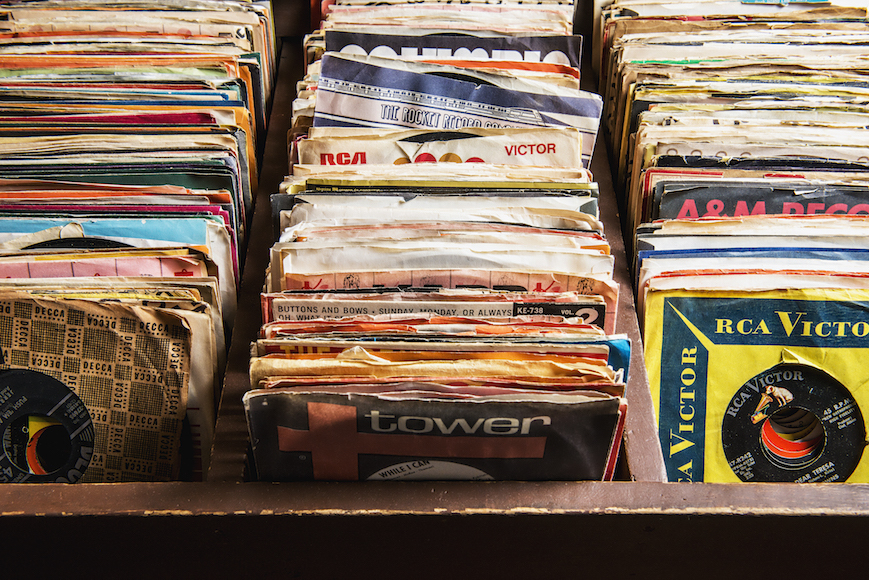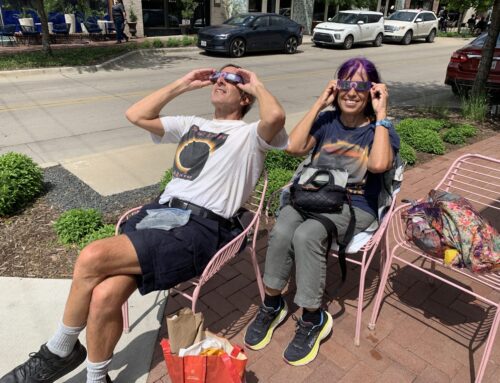Top Ten records is solid gold in West Dallas

Stacks of 45s at Top Ten Records. The shop once again sells vinyl records after ditching them around 1990. (Photo by Danny Fulgencio)
Mike Polk has a CD player in his car, but he doesn’t have any discs for it.
He doesn’t own a home stereo and he doesn’t claim allegiance to any favorite genre of music.
As owner of Top Ten Records since 1977, music is his business, but people are his life.
“I didn’t know the first thing about music when I started here,” he says. “I still don’t. I just listen to my customers.”
Dub Stark opened Top Ten Records in October 1956. The record store is still in its original location on Jefferson at Bishop, and it’s full of collectors’ treasures.
There’s an RCA Nipper figurine, a life-size cardboard cutout of Dolly Parton and a hand-painted sign announcing “Longhorn Ballroom advance tickets here.”
Catch Polk at the right time with the right offer and he might consider selling some of those things, although probably not.
What is for sale, though, are hundreds and hundreds of records.
Despite its name, the 60-year-old record shop hadn’t sold actual vinyl records for decades until recently.
“These are all records I took home 25 years ago,” Polk says of the boxes upon boxes full of never-played vintage records stacked on folding tables and lining the floor of the shop.
Polk stopped selling records around 1990, when demand for CDs and cassette tapes was high, and vinyl was all but dead. He got rid of fixtures that held records and replaced them all with CD-sized ones.
Now vinyl records are buoying the music industry and Polk has opened his garage. He did it as a way to raise money for the community radio station that has supported his shop for decades, KNON. Half the proceeds from vinyl sales go to KNON, and Polk keeps half.
DJ Daniel Boom, whose Midday Mix-Up show airs from noon-2 p.m. Mondays, helped Polk retrieve the records.
“It had to be at least 10,000 records,” he says. “The records lined the walls, floor to ceiling, all the way around.”
Now they’re all for sale at Top Ten, most of them cost $5 each, or five for $20. Some rare records — Tejano and oldies, mostly — are priced higher.
Polk says he met Boom when the man, now a father of three, was about 12 years old.
“I lived in Irving, and I would take the DART bus all the way to Oak Cliff to be able to shop there,” Boom says.
Top Ten, then as now, mostly carries music that appeals to the Latino listeners of KNON — Tejano, freestyle and rap. Whatever is not in stock, Polk will order.
A majority of neighbors and customers wanted those styles of music, also starting sometime around 1990. And Polk went with it.
In 39 years as a shop owner on Jefferson, Polk says, he’s never called the police, and he thinks crime on the boulevard is sensationalized. His landlord, Victor Ballas, hasn’t raised his rent in 15 years, although Polk says, it is up from the $225 a month he was paying in 1979.
When Dub Stark sold Polk the shop, he asked: “Are you the worrying type? Because if so, don’t buy this place.”
Polk is not the worrying type. When a customer walks in, he is laser focused on that person’s needs. He attends his customers to a fault.
“If you walk in here and I’m with another customer, I might not even notice you were here,” he says.
There’s no TV in the shop, and he’d never look at his watch or fiddle with his phone in the presence of another. When Polk is with you, he’s really with you.
“Be kind to yourself,” he says when customers leave. “I know I will.”





